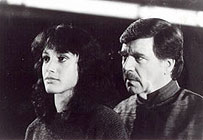|
|
|
|
Docteur
M
|
 |
|
Docteur M, a lavish international co-production, is not a terribly successful enterprise, but it's certainly an oddity. Claude Chabrol, who emerged with the Nouvelle Vague of the late 1950s, is best known and respected for his intricate, subtle thrillers like Le Boucher (1969) and Violette Nozière (1978). Docteur M, like Chabrol's other international efforts (including the dismal Quiet Days in Clichy [1990]), is a crazy patchwork of languages, accents, acting methods, plot intrigues and extravagant stylistic flourishes. Chabrol's artistic motivation is rather grand – to pay contemporary homage to the great German director Fritz Lang, and his magnificent series of Dr Mabuse films (1922, 1932 and 1959). Lang's Mabuse was a sinister, invisible figure who ruled others through a deviously manipulative use of the new electronic media – particularly radio and television. Chabrol's villain (played with unbelievable hamminess by Alan Bates) owns a television channel, a private nightclub, a sinister health resort and a personal army of chic assassins. His mad plan is to induce the world, via hypnotic auto-suggestion, into a frenzy of mass suicide. The film is full of portentous remarks – about beauty and death, dreams and reality, consumer society and the ex-Berlin Wall – that never take root in the drama. And Chabrol's key visual metaphor – a group of black-clad punks thrashing wildly to the gloomy strains of a band called Mekong Delta before video images of the Holocaust – is pretty laughable. But Docteur M, closer to the demented pulp poetry of Larry Cohen's Q – The Winged Serpent (1982) than the sophisticated sci-fi of Blade Runner (1982), has enough wit, drive and invention to be worth a look. MORE Chabrol: L'Enfer, Madame Bovary, La Cérémonie © Adrian Martin May 1993 |
![]()